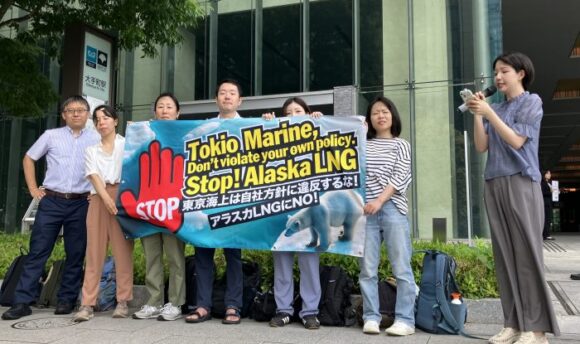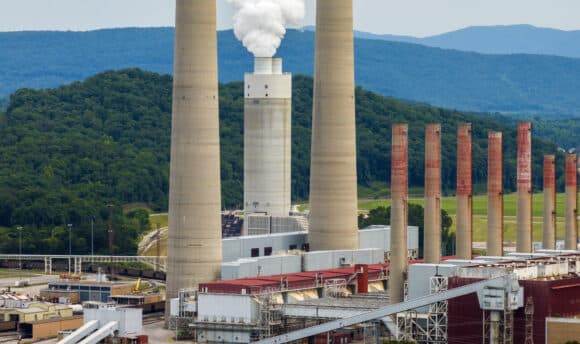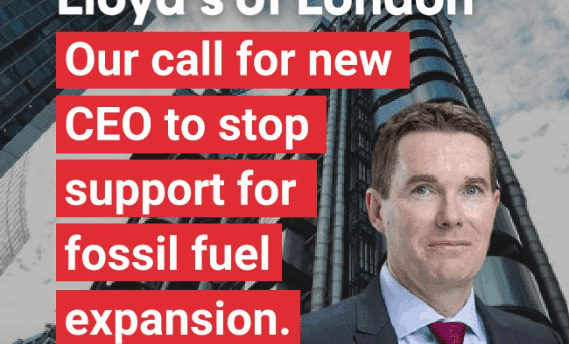Trieste, 22 October 2024 – Today, Italian insurer Generali announced it will no longer provide insurance for risks associated with oil and gas expansion, including new liquified natural gas (LNG) terminals and gas-fired power plants (1). Generali is the first insurer globally to adopt a policy covering the entire oil and gas value chain for ‘transition laggards’ (2), marking a major step forward in driving climate action. Despite the limits of the policy, Insure Our Future welcomes this announcement and urges other major insurers, such as Chubb, Allianz, AXA, and Sompo, to go further by introducing robust policies to end their support for oil and gas expansion on the entire value chain, including LNG.
Generali, one of the top 20 insurers globally (3) and Italy’s largest, had already made a commitment not to underwrite risks related to upstream oil and gas expansion (new oil and gas fields), and has now expanded this to include risks related to midstream and downstream oil and gas expansion (new LNG terminals, new oil and gas pipelines and new oil and gas-fired power plants).
While Generali’s commitment not to insure new upstream oil and gas projects applies to all companies, its policy for new midstream and downstream infrastructure only applies to energy companies found to be ‘transition laggards’.
This means new midstream and downstream oil and gas projects developed by companies not considered “transition laggards” could still be insured by Generali. Generali appears to believe that companies developing new midstream infrastructure could still achieve net zero by 2050. But the International Energy Agency’s net zero scenario is clear that any new oil and gas field or LNG export terminal threatens the achievement of the net zero goal (4).
The move to stop insuring new LNG terminals is significant, as LNG producers are planning to triple their production capacity globally to 1480 Mtpa (5). Just last week the International Energy Agency’s (IEA) World Energy Outlook highlighted again the risks of global over-capacity in LNG export facilities (6).
“Generali’s announcement is a first for the insurance world and a step forward but it does not go far enough. Generali's commitment to stop covering risks related to oil and gas expansion leaves the door open to new developments. It seems to think that a company developing new oil and gas projects can be in transition. But the science is clear. There is no room for new oil and gas projects if we want to preserve an insurable world.Other insurers such as Allianz, AXA, Chubb and Sompo must step up and introduce policies covering all new oil and gas projects now.”
“Generali's move is a clear signal to the market that long-term risks associated with oil & gas expansion have become too high. Italian financial institutions should recognise this and stop financing the new gas infrastructure of Italy's fossil giant, Eni, in line with IEA's recommendation to keep global warming under 1.5°C.”
The move could also have global implications.
“Generali's policy change could have major implications for Asian insurers, including Sompo, who will need to enforce effective policies to stop insuring new gas projects with significant climate impacts, such as the Rio Grande LNG export terminal on the Gulf Coast.”
“LNG terminals are disasters for the communities in which they’re built. Recent research linked 60 premature deaths a year to the air pollution from these methane export terminals in the US, fisherfolk have seen waters that were abundant for years run bare, and the same insurers underwriting these projects are abandoning homeowners. Insurers like Chubb, AIG, and Travelers, are running out of reasons to not follow the lead of Generali to avoid the risks of this destructive industry.”
Generali is also one of the insurers to have joined the Forum for Insurance Transition to Net Zero (FIT) (7), which was created to advance climate action across the insurance industry. Many major insurers, including Lloyd’s of London, have not joined the FIT. Moreover, Lloyd’s remains the only major insurer in Europe without any commitment to end underwriting for risks related to fossil fuel expansion (8).
Generali is also introducing new restrictions on its investment portfolio for companies identified as ‘transition laggards’. In particular, Generali will no longer invest in new bonds issued by such companies.
Generali’s policy to end its support for oil and gas expansion now sets the highest standard among global property and casualty insurers. This follows Zurich’s recent decision to stop insuring new oil and gas fields.
Campaigners are urging other insurers to follow Generali’s example, calling on AXA, Chubb and Sompo to introduce robust policies that address fossil fuel expansion, including LNG.
Notes
(1) See: https://www.generali.com/sustainability/our-commitment-to-the-environment-and-climate
(2) Generali methodology to assess energy companies and their ability to transition will be based on four pillars: decarbonization strategy and commitment, capital allocation and fossil fuel expansion plans, climate governance, lobbying practices
(3) Forbes, Forbes 2024: Top 20 largest insurance companies in the world, 2024
(4) International Energy Agency, World Energy Outlook 2024, 2024
(5) International Gas Union, 2023 World LNG Report, 2023
(6) “In the NZE (Net Zero Emissions) Scenario, investment in existing fields is needed to ensure that supply does not decline faster than demand, but no new conventional long lead time oil and gas projects are developed after 2023 and investment is much lower than today.” IEA World Energy Outlook 2023, p135
(7) See Forum for Insurance Transition to Net Zero
(8) See For a Few Dollars More – the fossil fuel policies of Lloyd’s managing agents 2, Reclaim Finance, October 2024



